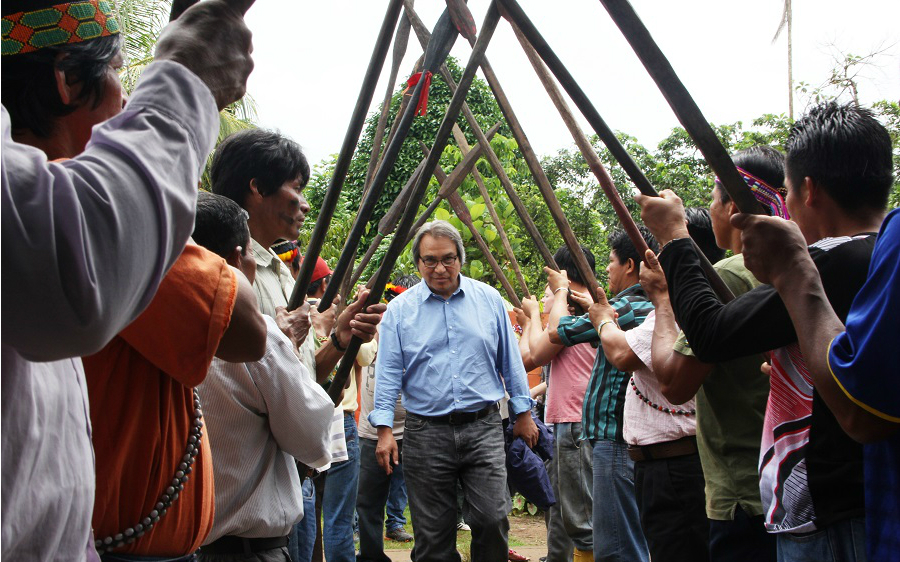Protestors and UN report test Peru’s new indigenous peoples’ consultation law
 An Achuar man paints his face in the Amazon basin in northern Peru. Photo: Olaf Malver / Natural Habitat Expeditions http://bit.ly/1nWWMIV
An Achuar man paints his face in the Amazon basin in northern Peru. Photo: Olaf Malver / Natural Habitat Expeditions http://bit.ly/1nWWMIV
Groups find significant gaps in the Peruvian government’s approach to protecting indigenous rights.
Protestors were occupying the oil installations of Argentine oil company Pluspetrol in northern Peru just a few weeks ago. The Achuar indigenous people, who reside in the remote Amazon headwaters along the border with Ecuador, demanded that the government provide a solution to the problems caused by decades of pollution by oil companies on the lands where they reside, specifically block 192 – also Peru’s most productive geographic area.

So it’s timely that UN Special Rapporteur on the Rights of Indigenous Peoples James Anaya released this week his much-anticipated report on the situation of indigenous rights in Peru with regard to extractive industries. Drawing on information gathered during his visit to Peru in December, he finds that the Peruvian government needs to do more to ensure that companies carry out oil and mining projects in a way that respects indigenous peoples’ rights and responds to their concerns. Indigenous communities in Peru have not chosen to reject extractive industry development across the board (as Anaya points out in his report), but in instances where they do, their decision should be respected.
The very reasonable demands of indigenous communities in Block 192 have centered on outstanding concerns around issues such as land titling, compensation for land use, and cleaning up polluted areas. Though Peru’s environmental laws have been strengthened since 2000 (the year that Pluspetrol took over the block from Occidental Petroleum), serious outstanding pollution issues have yet to be addressed.

For example, in his visit to block 192 in December, Anaya observed oil in and around three lakes as well as “junk heap cemeteries” of materials left from Occidental’s time in the area. With regard to projects that have “endangered the health and well-being of indigenous peoples,” including block 192 in particular, Anaya recommends that the Peruvian government:
“…ensure environmental remediation and facilitate compensation demanded by indigenous communities for the use or loss of their traditional lands, and for other harms they have suffered due to extractive activities, and recognize their traditional land and natural resource rights.”
At the national level, Anaya’s report identifies some key gaps in the implementation of Peru’s indigenous peoples’ consultation law, such as the need to:
- Build government capacity in terms of methodologies, logistics, and budget;
- Facilitate indigenous participation in strategic planning for the extractives sector;
- Involve indigenous communities in decision-making throughout the life of projects; and
- Ensure that consultations in the mining sector occur prior to the award of mining concessions.
In addition, Anaya highlights the importance of Peru’s community consultation processes being consistent with international standards and in compliance with the principle of Free, Prior and Informed Consent. Specifically, he states:
“Indigenous peoples should be able to oppose or refuse their consent for extractive projects without any type of reprisals or acts of violence, or wrongful pressure to accept or initiate consultations around extractive projects.”
Without these fundamental conditions, consultations run the risk of simply paying lip service to indigenous rights. And with regards to the Achuar protestors, responding to their demands on land titling, land use compensation, and pollution clean-up are critical first steps in establishing the trust necessary for the government to implement good faith consultation with them about future drilling in Block 192.
Achuar protestors have since called off the protest and agreed to dialogue with the government, but the government has yet to demonstrate to the Achuar and other local indigenous leaders that their demands will be met.